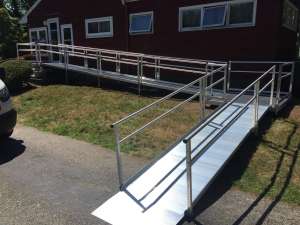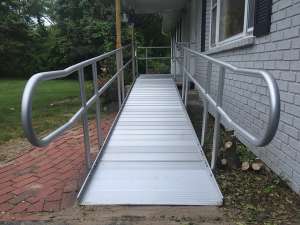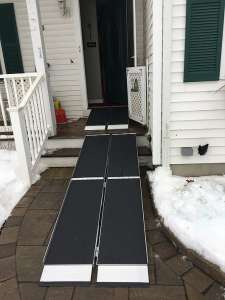Benefits of Wheelchair Ramp for Your Home
Are you curious about the benefits of wheelchair ramps? These ramps are life-changing, offering increased independence and safety for those with mobility challenges. In this article, we discuss the benefits of wheelchair ramps, exploring how these structures not only improve house accessibility but also play a crucial role in building accessible environments that empower individuals to live their best lives more freely. In this guide, we will explore the different types of ramps, materials and construction, safety features and accessories, and environmental considerations to help you make an informed decision when choosing a wheelchair ramp.
Key Takeaways
- Wheelchair ramps enhance independence by providing safe and accessible entry and exit for individuals with mobility challenges.
- These ramps improve safety, reducing fall risks with stable, non-slip surfaces, while also boosting confidence and self-reliance for users.
- Quick installation and cost-effective solutions make wheelchair ramps an attractive option, with customizable designs available to meet diverse needs.
- Customers report high satisfaction with wheelchair ramps, noting significant improvements in their daily lives and mobility. Testimonials and statistics highlight how these ramps help customers overcome mobility challenges.
Types of Ramps

There are several types of wheelchair ramps available, each designed to meet specific needs and requirements. Some of the most common types of ramps include:
- Permanent Ramps: These ramps are installed permanently and are ideal for homes and buildings with a permanent need for accessibility. They provide a reliable and long-term solution for wheelchair access.
- Portable Ramps: Lightweight and easy to move, portable ramps are perfect for temporary or occasional use. They offer flexibility and convenience, making them ideal for travel or visiting places without permanent ramps.
- Modular Ramps: Composed of multiple sections, modular ramps can be easily assembled and disassembled. This makes them suitable for homes and buildings with changing accessibility needs, providing a customizable solution.
- Threshold Ramps: Designed to provide easy access over thresholds, these ramps are perfect for homes and buildings with narrow doorways. They bridge small elevation differences, ensuring smooth transitions.
Improving Safety and Reducing Fall Risks
Safety is a primary concern, especially for individuals with mobility challenges. Wheelchair ramps provide a stable surface that minimizes the risk of slips and falls, which is particularly important for seniors. These ramps feature non-slip surfaces that ensure safety on inclines, minimizing accident risks.
Wheelchair ramps are designed with stability features that further minimize fall risks. These ramps help manage various height transitions in a home, which can pose significant fall risks for those with disabilities. Installing a ramp can also improve self-reliance and a sense of control over one’s living environment. We are proud to offer high-quality wheelchair ramps that enhance safety and independence.
Emotional and psychological benefits are equally important. Ramps alleviate the emotional strain of mobility challenges, enhancing confidence and self-esteem. Installing a ramp can bring comfort and safety to individuals recovering from medical conditions, providing a newfound sense of independence.
Enhancing Independence at Home
One of the most significant benefits of a wheelchair ramp is the enhancement of independence. These installations can be transformative, allowing individuals to move freely in and out of their homes without needing assistance. Whether you opt for wooden or aluminum ramps for wheelchairs, they will provide a safer and more accessible way to enter and exit homes, significantly boosting autonomy.
Portable ramps add another layer of flexibility, enabling users to access various environments with ease.
Quick and Easy Installation
One might think installing a wheelchair ramp is cumbersome, but that is far from the truth. Some wheelchair ramps can be installed as quickly as 24 hours after receiving a quote. Modular ramp designs allow for quick installation by a single person in less than two hours, making them incredibly convenient.
Experienced contractors often streamline the process to ensure quick installations tailored to your server needs. Professional installers offer same-day consultations for quick service setup, making the installation process hassle-free. Contact us for installations and personalized service.
While portable ramps take a few days to install, they offer flexibility for many households needing space.
Materials and Construction

Wheelchair ramps can be made from a variety of materials, each with its own unique benefits and drawbacks. Some of the most common materials used in wheelchair ramp construction include:
- Aluminum: Aluminum ramps are lightweight, durable, and require minimal maintenance, making them a popular choice for many homeowners and businesses. They are resistant to rust and corrosion, ensuring long-lasting performance.
- Steel: Steel ramps are strong and durable, but can be heavy and require more maintenance than aluminum ramps. They are ideal for heavy-duty applications where strength is a priority.
- Wood: Wood ramps offer a natural or rustic aesthetic, blending seamlessly with many home designs. However, they can be prone to rot and decay if not properly maintained, requiring regular upkeep.
- Concrete: Concrete ramps are durable and long-lasting, providing a permanent solution for wheelchair access. However, they can be heavy and require significant installation time, making them less flexible than other options.
Cost-Effective Solutions
Financial considerations are always a factor, but thankfully, wheelchair ramps offer cost-effective solutions. Health insurance companies often cover wheelchair ramps, categorizing them as home modifications. Some programs provide veterans with funding to choose necessary services. Many states also offer non-health insurance programs to help cover wheelchair ramp costs for the elderly and disabled.
There are also insurance companies that assist veterans in making home modifications, including ramps. Elder care loans can finance wheelchair ramps while awaiting other funding. Some equipment accessibility companies offer financing options to make wheelchair ramps more affordable.
The cost of modular ramps can vary widely. For a modular aluminum ramp, you can expect to pay a premium cost, depending on the complexity and length of the ramp. This price range makes modular ramps a viable option for many households looking to make their house more accessible.
Customizable Options for Every Need

Wheelchair ramps come in various types to fit different needs. There are five categories of wheelchair ramps: threshold, portable, suitcase, permanent, and modular ramps. Threshold ramps are lightweight and designed to bridge small elevation differences of less than 6 inches.
Wheelchair ramps come in various types to suit different needs. They can be categorized into five main types: threshold, portable, suitcase, permanent, and modular.
- Threshold Ramps: These are lightweight and designed to bridge small elevation differences, typically less than 6 inches, making them ideal for doorways and small steps.
- Portable Ramps: Perfect for temporary use, portable ramps can be easily moved and are convenient for travel or visiting places that lack permanent ramps.
- Suitcase Ramps: Similar to portable ramps, suitcase ramps fold up like suitcases for easy transport and storage. They offer a practical solution for on-the-go accessibility.
- Permanent Ramps: Installed as a long-term solution, permanent ramps are fixed in place and often constructed from durable materials like aluminum or concrete. They provide reliable access.
- Modular Ramps: These ramps are customizable and can be configured to fit specific needs
Install Wheelchair Ramps Now with Oakley Home Access in Narragansett, RI
Wheelchair ramps offer numerous benefits for house accessibility, from enhancing independence and safety to providing cost-effective and customizable solutions. They are designed to meet ADA compliance standards, ensuring accessibility and safety for all users.
At Oakley Home Access, our dedicated team of home safety experts is passionate about aging in place, fall prevention, and enhancing home accessibility. Owned and operated by registered, licensed CAPS certified contractors and occupational therapists, we are committed to improving the quality of life for individuals with mobility impairments.
Consider installing a wheelchair ramp to make your home more accessible and welcoming. Contact us today to learn how we can help you or your loved ones live safer and more independently in Narragansett, Rhode Island.
Frequently Asked Questions
What is a viable solution to eliminate entry barriers for seniors at home?
Installing a wheelchair ramp is an effective solution to eliminate entry barriers for seniors at home, enhancing their accessibility and independence. This modification ensures safer and easier access for those with mobility challenges.
What percentage of seniors prefer to remain at home as they age?
Approximately 90% of seniors prefer to remain at home as they age instead of transitioning to assisted living facilities. This highlights the strong desire for independence among older adults.
What is the recommended rise to ADA ramp slope ratio?
The recommended rise to ADA ramp slope ratio is 1:12, ensuring accessibility and safety for all users.
What is the weight capacity of a modular wheelchair ramp?
The weight capacity of a modular wheelchair ramp is typically 1,000 lbs, ensuring it can accommodate most users safely and securely.
